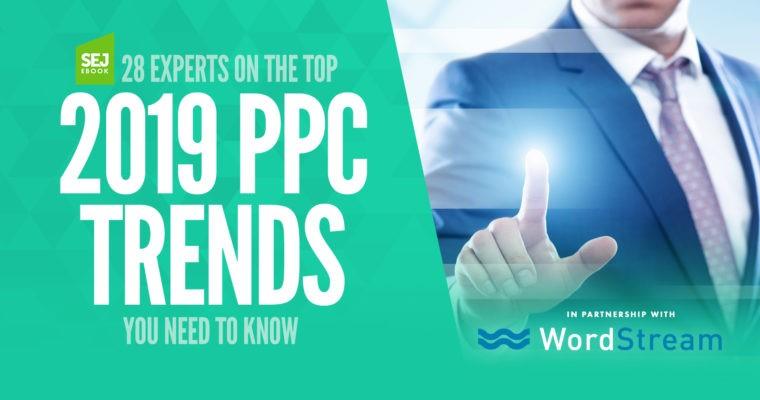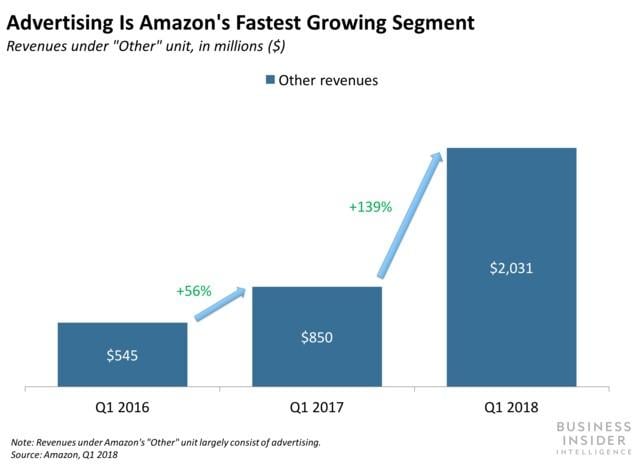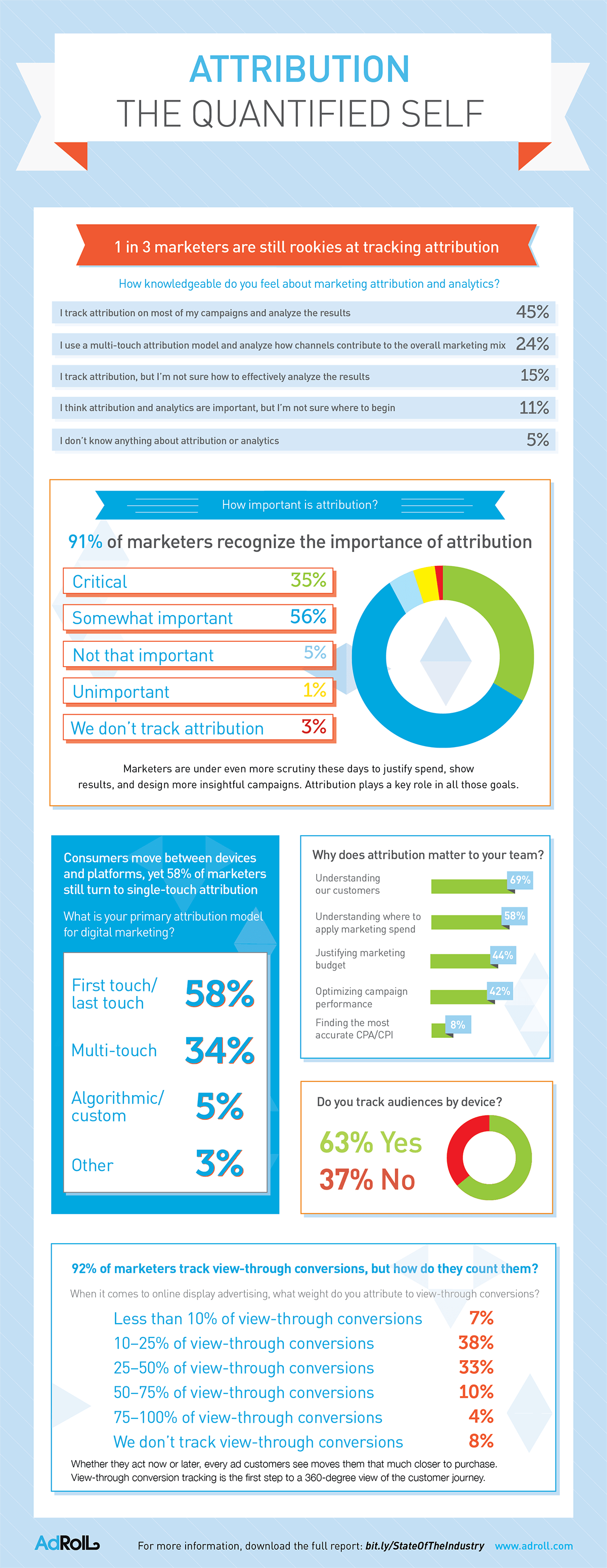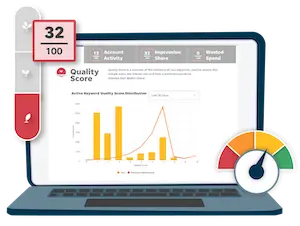
WordStream partnered with Search Engine Journal to find out what PPC experts are predicting for 2019. Below is an excerpt of the top 10 trends that 28 industry leaders expect to see next year – the top trends that marketers like you should jump on in 2019. Want to read the complete list, featuring insights from each of these 28 experts? Click here to download the complete Top 2019 PPC Trends You Need to Know.
2018 was another huge year in the world of PPC marketing.
We saw massive changes at Google, such as AdWords being rebranded as Google Ads; the new Google Ads “experience” (i.e., interface); and the launch of numerous new campaign types, features, enhancements, targeting options, and tools.
Meanwhile, at Bing Ads, we saw the launch of tons of new features, targeting capabilities, reports and other improvements – but the most exciting news was that we (finally!) saw the arrival of LinkedIn profile targeting.
We also saw the rise of Amazon as a potentially serious challenger to Google, with advertisers shifting budget toward Amazon because more people now begin their search for products on Amazon than Google.
So what does 2019 have in store for PPC marketers?
We asked 28 of the smartest PPC people I know to find out!
Last year some of the hot trends included artificial intelligence, voice search, audience targeting, and automation.
In 2019, though, clearly two trends are on just about everyone’s minds: Audiences and automation.
But that’s just the beginning.
Here are 10 of the biggest trends you need to know for 2019 – covering paid search, paid social, and remarketing – according to 28 of the top PPC marketing experts.
1. Audiences vs. Keywords
Aaron Levy of Elite SEM believes 2019 will be the year the keyword dies, as advertisers shift focus away from match types and terms toward context and people.
“It’s been a long time coming; search engines have given us too many additional levers to handle along with keywords,” Levy said. “I believe next year will the beginning of the end for keywords as a primary search lever.”
Not all are quite ready to declare the keyword dead, including Andrew Lolk of SavvyRevenue. If you aren’t using audiences, you’re doing PPC wrong, he said.
“Keywords will be important, but audience-targeting on the search network will in 2019 be of equal importance for securing high performance,” Lolk said.
Christi Olson, Head of Evangelism for Search, Microsoft, isn’t ready to declare the keyword dead, either.
“But what will continue to separate the best-in-class search marketers from the average Joes will be how audience data is are segmented and implemented via an audience targeting strategy,” she said. “The key to success in 2019 and beyond will be to create a detailed strategy of the various audience types and audiences lists and how you can layer them (with positive and negative bid types) to shape your paid search strategy.”
Purna Virji, Senior Manager of Global Engagement, Microsoft, suggests spending more time focusing on creating and optimizing your customer segments.
“Drill down in them even further, so your ad messaging can be as relevant and feel as personalized as possible,” she said. “This will be hugely important in 2019!” Brooke Osmundson, Senior Digital Manager, NordicClick Interactive, thinks audiences and keywords will still work hand-in-hand in 2019, noting that “this will be vital to learn what types of audiences are actually searching for your products and services.”
“In-Market audiences have proven to be effective [in 2018], and utilizing remarketing based off of top-funnel in-market audiences can help form a comprehensive funnel strategy,” she said.
2. Automation + Human Intelligence
Automation isn’t coming. It’s already here.
In fact, the trend we’re seeing from the engines is more automation, said Frederick Vallaeys, CEO, Optmyzr.
“Google said its search ads should be ‘ads that work for everyone’ and they mean it,” he said. “They believe automation makes it possible for more businesses to be successful search marketers so we’ll see more ‘smart’ features from Google, and Bing will follow in lock-step.”
Ben Wood, Digital Director, Hallam, expects Google Ads to continue to improve their built-in automation features.
“It’s approaching the point where it’s best to lean into Google automation tools rather than shun them in favor of third-party tools,” he said. “It’s no secret that Google wants advertisers to use their automated bidding strategies in campaigns, by increasing the number of data points used as part of their bidding strategies.”
But all this doesn’t mean you need to worry about being replaced by a machine.
Yet.
“It won’t be a race to see whether humans or machines are best,” Vallaeys added. “It will be a race to see which PPC experts have the best process to leverage the machines to blow away their competition.”
As Ilya Cherepakhin, Executive Media Director, Acronym, puts it: “With Google’s responsive ads launching, the latest change to exact match, and audience targeting gaining popularity, the days of manual campaign management are fading away,” he said. “Especially, when working on a large scale, machine learning is proving to be quite effective.”
That means you should free up time by letting the machines do the heavy lifting, Virji said.
“If you spend a lot of time on repetitive tasks such as bid tracking, or reporting, you can start to automate it even further, so you can spend more time on where it really counts: your customers,” she said.
Navah Hopkins, Services Innovation Strategist, WordStream, agreed. “Consider delegating grunt work (bid management, keyword variables, etc.) to automation and machine learning, while retaining tasks requiring creativity and brand/business knowledge (ad copy, campaign strategy, etc.).”
Evaluating the machine’s recommendations will be incredibly important in 2019 and beyond.
“Some are good, some are bad,” said Brad Geddes, Co-Founder, AdAlysis. “Smart marketers need to understand when to leverage and when to ignore the machine.”
3. Amazon & Advertising Alternatives
It’ll become more important than ever for marketers to diversify their PPC spend over the next year, according to Wesley MacLaggan, SVP of Marketing at Marin Software.
“We expect Amazon to continue its hot streak in 2019, with Sponsored Product Ads and other formats being a key aspect to a successful PPC strategy, especially for CPG and retail brands,” he said.
Lisa Raehsler, Founder, Big Click Co., said that 2019 will be an amazing time for ecommerce brands because they will have more opportunities to reach buyers with greater personalization and precision:
- Bing: Currently in pilot, Bing Ads is testing local inventory ads that display product stock availability nearby to drive in-store visits.
- Facebook: Improved ads to include a new instant storefront template format that can automatically generate a video with products personalized to users.
- Pinterest: New features allow users to buy directly from a product pin with price and inventory availability. Not only that, they will also be able to make personalized product recommendations to users.
- Google: Putting mobile first, Google’s local catalog ads feature local in-store availability and pricing in an easy scrollable mobile layout.
4. Account Management & The Role of PPC Marketers
AI is continuing to revolutionize PPC campaigns, according to Marc Poirier, CEO, Acquisio, but campaign managers are certainly not out of a job.
“In fact, campaign managers are now able to conduct their own machine learning battles to select which system will get their client’s or company’s campaigns the best results,” he said. “As people are more comfortable with these advancements and are adopting them more frequently, the machine battles for best performance will escalate this year.”
Daniel Gilbert, CEO, Brainlabs, believes that all PPC managers need to start thinking about how to adapt their skill set in the age of machine learning.
“We’re not quite at the stage where AI can outperform humans, but we’re getting closer,” he said. “Knowing how to leverage automation and developing skills like new-market analysis, cross-channel strategy, and complex competitor strategies is a must for anyone in this space.”
Vallaeys said PPC professionals will have a lot of strategizing to do in 2019 to find their place in an ever-more automated industry.
“I believe that layering sophisticated management on top of the engines’ automations will produce the best results so there will be plenty of opportunity for practitioners to shine,” he said.
So what’s the future for PPC marketers?
“The PPCer of the future will utilize smart automation for bidding, ad testing, and serving, and query mining in order to make more efficient accounts and leave the PPCer to the weapon with which she can still soundly defeat any machine: all things client (or boss!) –facing,” said Kirk Williams, Owner, ZATO. “We see the future of paid search resting in efficient accounts that allow the PPCers (who still want their jobs) to invest their time in troubleshooting, analysis, reporting, CRO assistance, projections, and… probably meetings.”
As Susan Wenograd, Account Group Director, Aimclear, points out, while managing all those numbers and all that math, never forget: you are a marketer!
“Keep sharpening that skill,” she said. “You will stay ahead of the game, because you won’t care what algorithms change or what features disappear since you aren’t so beholden to them.”
5. Attribution & Cross-Channel Advertising Experiences
More companies are embracing that we don’t live in a single channel world and are advertising (or marketing in general) across multiple different platforms more than ever, said Michelle Morgan, Director of Client Services, Clix Marketing.
That’s why Amy Bishop, Owner, Cultivative, expects an increased focus on cross-channel and cross-device attribution.
“It has become easier and easier to build well-coordinated multi-channel campaigns, but reporting silos continue to be a challenge for many businesses,” she said. “I expect to see an increased investment in reporting and attribution martech and a higher level of pressure on all marketers to connect the dots across channels and devices as it pertains to results.”
The problem?
There’s still no perfect fix, Morgan said.
The solution?
“Continuously tweak and adjust models based on performance,” Morgan said. “No single attribution model makes sense for all businesses, so it’s up to us all to find what works best for our unique snowflake of a business model.”
One solution comes from Pete Kluge, Group Manager, Product Marketing for Adobe Advertising Cloud. He said savvy marketers should strive to deliver advertising experiences in 2019.
“Advertisers must understand that reaching consumers and keeping them engaged through each stage of the purchasing funnel requires the delivery of positive experiences that keep them wanting more – and search is very often part of that journey,” he said. “Delivering positive advertising experiences, specifically with search, will be the backbone of any marketing campaign as we move into the future.”
Added MacLaggan:
“As the worlds of search, social and ecommerce blend together, marketers will need a complete view of the entire customer journey so they have a more accurate understanding of campaign performance and attribution, and can allocate PPC budget accordingly.”
6. Ads
The ads themselves – the messages users see – will remain as critical as ever.
“Should you use RSAs, Text Ads, the third headline (it’s debatable if you should skip the line or not); and really looking at the cohesion of your ad message,” Geddes said.
Pauline Jakober, Founder & CEO, Group Twenty Seven, added:
“In addition, with multiple versions of headlines and descriptions available to us, I predict that strategic marketers will need to become more deliberate in considering whether headlines one, two, and three will work with description lines one and two. (And don’t forget about extensions!)”
7. Videos
Hopkins said you should plan to build social (specifically video) into your strategies as social gains increasing placements on search engine result pages (SERPs).
“Even if you don’t want to put ad spend into video (average cost per view is $0.02), you can still leverage YouTube as an audience target for your search campaigns,” she said. “This is particularly useful if you’re in an expensive industry, and need help focusing your budget.
Gilbert added that video has emerged as the top type of mobile content.
“We’ll be seeing platforms encouraging advertisers to adapt to more updates like Google’s recent vertical video ads,” he said.
8. Remarketing
Larry Kim, CEO, MobileMonkey, said he is exclusively focusing on remarketing in 2019. Why?
“Because they have much higher CTRs and conversion rates.”
He has also been combining remarketing with Facebook’s Click to Message ad format.
“Combining these two tactics yields ROI that I haven’t seen since 2013 when ad prices were much lower,” he added.
9. Brand Building
2019 will be about brand building, according to Jeff Allen, President, Hanapin Marketing.
“PPCers have been so focused on ROI that they forget marketing is also about creating demand for a product and, hopefully, creating brand loyalty, too,” he said. “From display, to YouTube, to keeping some low-performing generic keywords running… digital marketing in 2019 will stop trying to make every click profitable and start segmenting strategies by goals.”
“Platforms and tactics will come and go – a concentrated push to prioritize brand affinity and loyalty will stand a longer test of time,” Wenograd added.
10. More New Ad Types, Extensions, & Features
Without a doubt, 2019 will feature several known unknowns for PPC marketers.
That is, we know there will be several new ad types, reports, and tools – but exactly what kind, we don’t know about yet.
“Local Services Ads will roll out nationwide and for additional industries. We can expect to see a shift in query volume from the standard keyword to text ad to landing page process, and start to think about localization and conversion based opportunities,” Levy said.
“I expect that ads will start to permeate other facets of Google and Bing like maps, knowledge panels, answer boxes et. al. as Google starts to monetize ‘position zero’ and incentivize advertisers to keep their users right on the SERP.”
In the end, though, that’s what makes PPC marketing so challenging and so rewarding.
Want More PPC Trends & Insights for 2019?
Click here to download the complete 28 Experts on the Top 2019 PPC Trends You Need to Know.
















Comments
Please read our Comment Policy before commenting.